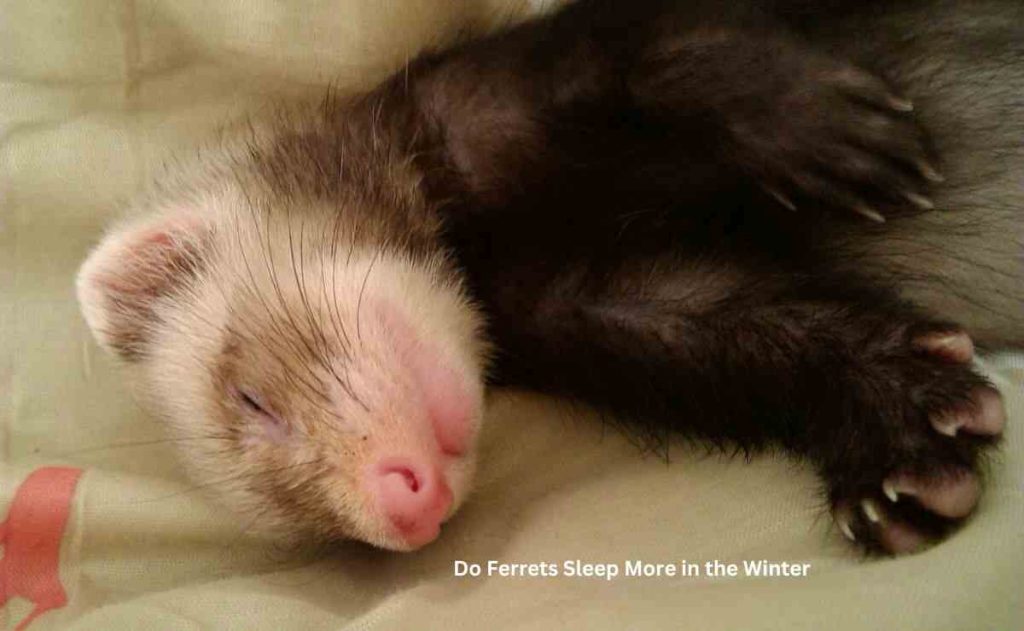Ferrets are unique pets that require a specific care regimen to ensure their health and happiness. One of the most important aspects of ferret care is monitoring their sleeping habits. As winter approaches, many ferret owners wonder if their furry friend will need more sleep during the colder months.
In this article, we’ll explore answer to the query “do ferrets sleep more in the winter” and what factors may contribute to changes in their sleep patterns.
Ferrets are known for being active and playful creatures, but they also need plenty of rest to maintain a healthy lifestyle. Understanding how seasonal changes affect your ferret’s sleeping habits can help you provide the best possible care for your furry friend year-round.
Do Ferrets Sleep More in the Winter?

Yes, ferrets do tend to sleep more in the winter. This is due to their natural instinct to hibernate during colder months. When the temperature drops, ferrets will naturally become less active and more inclined to sleep.
Ferrets typically sleep around 15-18 hours a day, with some sleeping even more than that. During winter, they may increase their sleeping time by up to 20 hours per day. Ferrets are not comfortable with too much cold temperature. As such, it’s important to make sure your pet has plenty of warm and comfortable places to rest during the cold season.
It’s also important to keep an eye on your ferret’s health during the winter months. If you notice any changes in behavior or appetite, consult with a vet as soon as possible. With proper care and attention, your ferret can stay healthy and happy all year round!
Why Do Ferrets Sleep More in the Winter?
Ferrets are crepuscular animals, meaning they are most active in the morning and evening. During the winter months, when the days are shorter and darker, their activity levels drop significantly. This is because their body clocks become out of sync with the daylight hours, so they spend more time sleeping to conserve energy.
In addition to this natural response to shorter days, ferrets can also be affected by temperature changes in the environment. Since ferrets have a thick coat of fur that helps keep them warm in cold weather, they may sleep more in order to conserve heat and energy.
Overall, ferrets sleep more during the winter because it is both a natural response to shorter days and a way for them to conserve heat and energy. Understanding this behavior can help you provide your pet with the best care possible throughout the year.
How Many Hours Do Ferrets Sleep Normally?
Ferrets are known for their energy and playfulness, but they do need plenty of rest too. On average, ferrets normally sleep between 18-20 hours per day. However, this can vary depending on the individual ferret’s age and activity level.
Younger ferrets typically need more sleep than older ones, while those that get plenty of exercise during the day may need less sleep than those that don’t. Generally speaking, ferrets will take several naps throughout the day lasting anywhere from 10 minutes to a few hours at a time. Sometimes they may sleep opening their eyes too.
It’s important to make sure your ferret has a comfortable place to sleep with no disturbances so they can get the rest they need. If your ferret seems unusually sleepy or lethargic during the day, it could be a sign of an underlying health issue and should be checked out by a vet.
Do Ferrets Hibernate?
No, ferrets do not hibernate. Ferrets are members of the Mustelidae family, which includes weasels, badgers, and otters. These animals are known as “hypercarnivores” because their diet consists almost entirely of meat, and they have a high metabolic rate that requires them to eat frequently throughout the day. As such, they cannot store enough energy to survive a long period of inactivity like hibernation.
Ferrets also lack the physiological adaptations necessary for hibernation, such as an increase in body fat and a decrease in heart rate and breathing. In addition, ferrets are active during the day and sleep at night, rather than sleeping for extended periods like hibernating animals do.
Despite this, some ferret owners may notice that their pets become less active during winter months and they may often found as dead sleep. This is likely due to shorter days with less sunlight and lower temperatures outside making it less appealing for them to explore their environment.
How to Keep A Ferret Cheerful During Winter?
Keeping your ferret cheerful during the winter months is an important part of providing a healthy and happy home for your pet. Here are some tips to help keep your ferret in good spirits:
- First, provide plenty of enrichment activities. Ferrets are very active animals and need plenty of stimulation to stay content. This can include interactive toys, puzzle feeders, tunnels, and even supervised playtime with you or another ferret.
- Second, make sure to adjust their diet accordingly. During the colder months, ferrets require more calories than usual to maintain their body temperature. Providing them with a portion of high-quality food that is rich in proteins and fats can help ensure they’re getting the nutrients they need.
- Finally, create a warm and cozy environment for them to relax in. Ferrets enjoy snuggling up in soft bedding or blankets to keep warm during winter months, so make sure there is plenty of space for them to do this comfortably.
Conclusion
In conclusion, it is likely that ferrets sleep more in the winter due to their natural instinct to conserve energy during colder months. While there is limited research on the topic, many ferret owners have reported observing increased sleeping patterns during winter.
As responsible pet owners, it’s important to provide our furry friends with a comfortable and cozy environment during colder months. This may include providing extra blankets or bedding and ensuring that the temperature of their living space is maintained at a suitable level. By understanding and accommodating our ferret’s natural behavior, we can help to ensure their health and happiness throughout the year.
